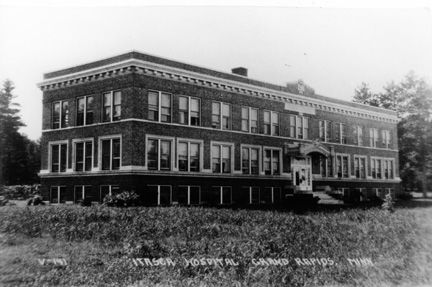
In the far north, along a ribbon called the Mississippi River, eagles perch on the branches of the gray pine trees. At their choosing, they’ll launch and fly downward at a long angle, eyes fixed and legs tucked. Gliding and gaining speed, they cruise at top speed parallel to the water. At coordinates measured in quarter-inches, they slowly drop a leg, maybe two, to tap the current and slice the water. A fish is pierced, lifted, and raised, all at once. The predator pulls sharply up, beating its great wings and tracing an arc back to the dead tree where it began. That’s the future, for predator and prey alike, on the river.
For now, though, the eagles wait. They tighten their talons on the scraggly limbs. A cold wind ruffles their feathers and disappears into the dark woods where the live pines sway. Winter is coming to the logging town of Grand Rapids, Minnesota on November 13, 1918.
Grand Rapids and its few thousand people have a new hospital. Inside, it’s a spectacular day for George and Carrie Jacobs. The reason is Vivian. She’s born, she’s alive, and she’s their daughter. The Jacobs family celebrates along the river that Abraham Lincoln called “The Father of Waters.”
The happiness of one family is a drop in the American ocean today. Millions upon millions of people have been in the streets of cities, towns, and villages for the past three days. They are joyous, raucous, uproarious at the real and genuine news that the World War is over! Ended! Won!
Can there be a bigger thing than final victory in the War-To-End-All-Wars?
Since official word arrived early on November 11, everyone has been celebrating. A kind of four-part template has arisen. People spilled out of homes and workplaces for their own informal parades. Governors then did catch-up with declarations of a recognized holiday. Following that, mayors, councils, boards, and any other executive community entity announce special speeches, ceremonies, and gatherings in another day or so to mark the life-changing occasion. By today the final part of the template emerges as people tire out, calm down, and clean up. Mixed into the final part are further reports of rapid and haphazard changes to the treaty and agreements that had ended fighting—the Armistice—on November 11. No one stops to think through or think out the ramifications of any of these sudden alterations to the Armistice. The only thing anyone cares about is that the World War is over.
And the timing could not be better.
Influenza appears to be dwindling at the same time the war has ended. The state health department in Texas states that the epidemic phase is gone. In Nevada County, California local health officials say the same thing. In Fort Wayne, Indiana nine local Catholic parishes hold mass in open-air services. Virginia’s board of health deems it sufficient to print easy-to-understand instructions for avoiding influenza for children returning to school. The numbers of new cases fall consistently in city after city after city.
To win the visible war abroad and the invisible war at home has a feel of truth. It just seems the right way to end, like the natural harmony of the eagle and the river. In American eyes influenza and the global conflict had grown up together and now would end together.
On smooth water, they shared a destiny.
A thought for you on Day 67, May 18, 2020, sixty-seven days after President Trump declares Covid-19 a national emergency—Vivian. She’s a day old on Day 67. Within six days, her mother dies. Within ten days, her father dies. Influenza victims, both. On the eleventh day her maternal grandparents commit their futures to the rest of her life. They will raise her. Vivian doesn’t know it yet but her life will unfold in the long shadow not of influenza but of Warfluenza. The combination of the World War and influenza is the life that Americans have led in 1918; each affects the other. And so Vivian’s parents succumb to an influenza revived through public reactions to the end of the World War two days before her birth. The war produced a beginning to a sickness while the end of the war renewed the strength of the same sickness. There, then, is the harmony that life revealed, not the version we expected or preferred or desired. The lesson here is that we should not assume too quickly that we have the insight, that we possess the foresight. It is very possible that the thing we believe to be entirely natural, correct, and justified is the thing that either never happens or never happens according to our timetable. If we don’t, at the least we will pay a price of personal disappointment. At the worst, we will fail someone who needs us, who relies on us, whose future will be derailed as a result of us. Need an example? Think of Vivian.

(note to reader—I invite you to subscribe to this series/blog. The purpose of my posting in this series is the purpose of my enterprise at Historical Solutions—to explore the past in a new way that brings new and different value to you, both in the present (this minute) and on the edge of the future (what’s ahead or forward of this minute). The past is everything before now, the totality of all time before the present; history is a set of very small slices of the past that, for a particular reason, have been remembered. If you wish to contact me privately, please do not hesitate to text or call 317-407-3687)







